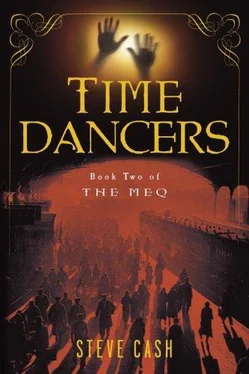Steve Cash - Time Dancers
Здесь есть возможность читать онлайн «Steve Cash - Time Dancers» весь текст электронной книги совершенно бесплатно (целиком полную версию без сокращений). В некоторых случаях можно слушать аудио, скачать через торрент в формате fb2 и присутствует краткое содержание. Год выпуска: 2006, ISBN: 2006, Издательство: Del Rey, Жанр: Фэнтези, Детективная фантастика, ya, на английском языке. Описание произведения, (предисловие) а так же отзывы посетителей доступны на портале библиотеки ЛибКат.
- Название:Time Dancers
- Автор:
- Издательство:Del Rey
- Жанр:
- Год:2006
- ISBN:0345470931
- Рейтинг книги:4 / 5. Голосов: 1
-
Избранное:Добавить в избранное
- Отзывы:
-
Ваша оценка:
- 80
- 1
- 2
- 3
- 4
- 5
Time Dancers: краткое содержание, описание и аннотация
Предлагаем к чтению аннотацию, описание, краткое содержание или предисловие (зависит от того, что написал сам автор книги «Time Dancers»). Если вы не нашли необходимую информацию о книге — напишите в комментариях, мы постараемся отыскать её.
Time Dancers — читать онлайн бесплатно полную книгу (весь текст) целиком
Ниже представлен текст книги, разбитый по страницам. Система сохранения места последней прочитанной страницы, позволяет с удобством читать онлайн бесплатно книгу «Time Dancers», без необходимости каждый раз заново искать на чём Вы остановились. Поставьте закладку, и сможете в любой момент перейти на страницу, на которой закончили чтение.
Интервал:
Закладка:
“Too late?”
“Yes. If…no, I should say when the Japanese are finally at war with the West, the Fleur-du-Mal will surely return to his castle and Zuriaa, and especially Susheela the Ninth. He will not lose her nor take the chance of it. I have no doubt.”
“How do you know the Japanese will be at war with the West?”
“I have seen countless wars begin, Zianno. Except in scale, this one is no different. Believe me, another world war is coming. It is simply a matter of time.”
Luck was with us crossing the Bering Strait and sailing south to the fishing lanes along the coast of Russia. Isipo handled the trawler skillfully, while navigating our way through wild and turbulent seas. Many times, the troughs between waves sank twenty to thirty feet deep. Nevertheless, in a month, we were preparing to enter Avacha Bay and the city of Petropavlovsk. It was bitterly cold, but clear, and the majestic, snow-covered peaks of three separate volcanoes rose up behind and around the old port.
“Koryaksky, Avachinsky, and Kozelsky,” Isipo said, waving at each of them one by one. “Most beautiful,” he added with a grin.
There was a sizable Soviet naval force stationed in Petropavlovsk, as well as an extensive coast guard. Isipo was stopped by a small patrol boat and asked a few questions. Gratefully, we were cleared and told to proceed into port. We made repairs and restocked supplies, then set out for the Kurils the next day.
In three weeks, we’d snaked our way south as far as Kunashir Island, where we were surprised just after dawn by a Japanese naval patrol. While Sailor and I stayed silent and unseen in the background, Isipo showed the young lieutenant his false papers. The lieutenant scanned the papers and gave Isipo and Sak a hard, vicious look, followed by an expression of disgust. He turned and ordered his first officer to draw his pistol and arrest Isipo. Sailor and I glanced at each other. We hadn’t used the Stones in years, but we had no choice. Without hesitating, Sailor and I withdrew our Stones and held them out toward the two sailors.
“Lo geltitu, lo geltitu,” we droned in unison. “Ahaztu! Ahaztu!”
The lieutenant’s face suddenly clouded over with confusion and he instantly went blank. His first officer dropped his pistol on the deck and stared at it, as if the gun had no meaning whatsoever.
“Go like lambs, now, Giza. You will forget,” Sailor said in perfect Japanese. “Ahaztu!” he repeated.
The two sailors climbed slowly back into their patrol boat and the lieutenant walked numbly toward the bow and pointed with a weak finger in the direction of the port of Yuzhno-Kurilsk. In minutes, the patrol boat was over the horizon and Isipo headed the trawler south to Hokkaido. He and Sak never said a word about what they’d witnessed. They both seemed to have expected it. By the time the sun set, we’d cleared the straits and rounded the eastern coast of Hokkaido and were slipping into Kushiro as just another fishing boat, coming in a little late. After all that time in Alaska, we were finally in Japan. It was the last day of January 1940. That same night, Sailor’s dreams began again.
We said farewell to Isipo from the docks in Kushiro. He was going to return to Petropavlovsk and spend a few weeks, depending on the weather, and eventually sail home to Alaska and the Seward Peninsula. Sailor thanked him in Ainu and in Meq. Isipo nodded and shook our hands. His hands were strong and sinewy as rope. He told Sak to come home in one piece, then said good-bye.
We turned and disappeared fast. We had no legitimate identification, and wouldn’t have until we reached Sapporo and the home of Sak’s sister, Shutratek. It helped that Sak was an Ainu and he and Sailor spoke Japanese, but none of us were legal. We decided in case we were asked for identification, Sailor and I would pose as Portuguese orphans abandoned in Macao and rescued by Sak. Luckily, we had no confrontations because the story would never hold up to someone like the naval lieutenant we had encountered at sea. Neither Sailor nor I wanted to use the Stones again unless absolutely necessary.
We followed several lonely, wintry roads to Obihiro, catching short rides where we could. There weren’t many. Along the way, we exchanged our Western clothes, piece by piece, until we were indistinguishable in a crowd. In Obihiro, we obtained seats on the only bus traveling through the mountains to Sapporo. It was a long, beautiful, treacherous journey, and cold. Sailor seemed to doze and sleep often on the trip, much more than usual. Every time he woke he muttered a name under his breath. He said the name slowly, with his eyes closed and a faint smile on his lips. In a low whisper, he breathed, “Su…shee…la.” He said it with such quiet reverence, I could think of only one thing. I knew it didn’t make sense, but it sounded as if he was in love.
As we approached the outskirts of Sapporo, Sak seemed bewildered by how much the city had changed and grown since he’d last seen it. I asked how long it had been and he paused before answering. He was anxious and agitated. I knew something or someone had driven him from Sapporo and his family years earlier, but he’d never given a reason and I’d never asked. Sak said, “Thirty years next month.” His anxiety was understandable. He also had no gift to give his sister, and this seemed to upset him more than anything else. Sailor solved the problem by removing the piece of onyx hanging on the tassle of the small braid behind his ear. “This should suffice,” Sailor said. “It is very old and from very far away—Ethiopia.” He handed Sak the polished black stone. Sak accepted it humbly and thanked Sailor for saving him profound embarrassment.
Shutratek lived in a large complex of houses and buildings, all clinging to and around the sides of a steep hill. A wide veranda circled the house on three sides and made the view even better. Birch trees and scrub pine crowded the hillside. Falling snow kept the neighborhood quiet and traffic was light. Sak knocked once on the door.
When their eyes met Shutratek and Sak both began to cry. Neither made a sound. He presented her the stone and they held each other in silence and let the tears roll down their faces. Shutratek was in her mid-sixties; a short, stout woman with steel gray eyes and silver hair pulled back and tied in a bun at the back of her head. “My brother,” she said finally in Ainu. She looked once at Sailor, then over to me and smiled. I wondered if she remembered. “You have very old eyes for one so young,” she said. I laughed then, recalling what her father, Sangea, had told her to tell me on the train.
“I wasn’t sure if you’d remember,” I said.
Shutratek laughed along with me, a big hearty laugh for such a small woman. “Nineteen-oh-four,” she said. “Seems like yesterday.”
Shutratek served us a delicious fish and onion soup with noodles and she warmed her best sake. She smiled each time she looked in Sak’s eyes, but their reunion was bittersweet. Sak learned their father and his older brother, Nozomi, had been murdered only three years after Sak left Sapporo. He also learned his eldest brother, Bikki, the one who remained in the United States at the conclusion of the World’s Fair, had never come home. Shutratek and Sak were now each other’s last living relative. When Shutratek learned our purpose and the reason for Sak’s return was to find Xanti Otso and his fortress/prison, she gasped and covered her mouth with her hand.
“This one you seek,” she said, “he have green eyes, wear ruby earrings?”
“Yes!” Sailor interrupted. “Yes, he does.”
Shutratek turned and put both hands on her brother’s face. “This is same one who kill father and Nozomi,” she said. Waiting a moment, then speaking in Ainu, she said, “He carve roses in their backs, Tomizo.”
Читать дальшеИнтервал:
Закладка:
Похожие книги на «Time Dancers»
Представляем Вашему вниманию похожие книги на «Time Dancers» списком для выбора. Мы отобрали схожую по названию и смыслу литературу в надежде предоставить читателям больше вариантов отыскать новые, интересные, ещё непрочитанные произведения.
Обсуждение, отзывы о книге «Time Dancers» и просто собственные мнения читателей. Оставьте ваши комментарии, напишите, что Вы думаете о произведении, его смысле или главных героях. Укажите что конкретно понравилось, а что нет, и почему Вы так считаете.












